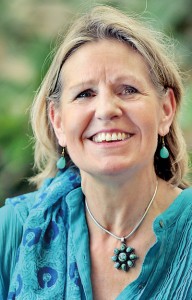An adventure coloured by indigo
 Dr Jenny Balfour Paul has little reservations about admitting to once being “a hippie”. Her first trip here we learn, was a minor detour from her visit to India.
Dr Jenny Balfour Paul has little reservations about admitting to once being “a hippie”. Her first trip here we learn, was a minor detour from her visit to India.
In a bold exercise of newly acquired independence at 18 after leaving her home in the UK she hopped aboard a ferry from India’s Southern coast.
Wandering as far as Trincomalee, she recalls spending many nights under star-speckled skies on local beaches. “I didn’t have money at the time to afford accommodation,” she says flatly.
This time around however, she was at the Fairway Galle Literary Festival as an invited author. Her subject – her latest book- Deeper than Indigo: Tracing Thomas Machell, Forgotten Explorer.
Her fascination with Indigo kicked in long after her backpacking travels in the 70’s. “My background is in Indigo” she shares, having studied possibly every form the deep blue shade has taken- be it textiles, dyes or shipwrecked cargo.
Indigo is extracted with the most complicated of processes, from a tropical plant of the same name.
Serving as consultant for documentaries and exhibitions on the subject, it was only a year after her first book in 1998 titled ‘ Indigo’ that she was introduced to the journals left behind by Thomas Machell.
“Someone saw a painting of his, with the word Indigo on its title and immediately told me about it.” Making her way through the painter’s records of his life in Bengal, she found he had written about and painted plantations of Indigo found there.
Leafing through the pages Dr Balfour Paul found herself feeling connected to the author, the latter having appealed to her flair for adventure.
“Here was a man” she explains, “who wasn’t supposed to live let alone be immortalised by his work.”
Considered the weakest among his three brothers, Thomas suffered a “birth defect” which she speculates “would have been a limp.” Contracting various other illnesses and stubbornly surviving, he boldly moved to India at 16, despite being medically forbidden to travel.
Laughed at by his British peers residing in Bengal, he had a distaste for the colonial Raj. “He was the sort of person who would attend a village wedding.”
This facet of his character stood-out to Jenny who holds a PhD from the Arabic Department of the University of Exeter for her research in the Middle East.
“He even grew out his beard and travelled with Arab merchants for nine months” we’re told, and “is probably the only one from the UK to do it.”
Deciding to document her quest in book form after locating the indigo plantations recorded in the century-old entries, “what we didn’t realise” she says is the borders have shifted significantly since the 1800s.
The perilous journey resulted in stolen luggage and immediate deportation because “it was no longer East and West Bengal.”
The journey which began five years ago was also one of discovery. Not one to conjure-up imaginative landscapes, much like the original documenter, “I’m an on-site sort of writer” she smiles. Keeping journals is also a shared hobby – “I still have my first diary from when I was 5.”
Rough roads account for only half of the struggle. “You often find yourself in situations you would think one would be incredibly daft to be in.
It isn’t until, you’re the only woman out at night sharing a taxi with five strange men in Bengal that you tend to reflect about how one finds oneself in such a place,” she smiles.
The risk is well worth the reward however. An unforgettable moment she says is the panoramic view of mud architecture scattered in a valley on a Yemeni border.
Her endeavour’s biggest victory – locating six years of journals – the missing link to Thomas Machell’s grand adventure.


